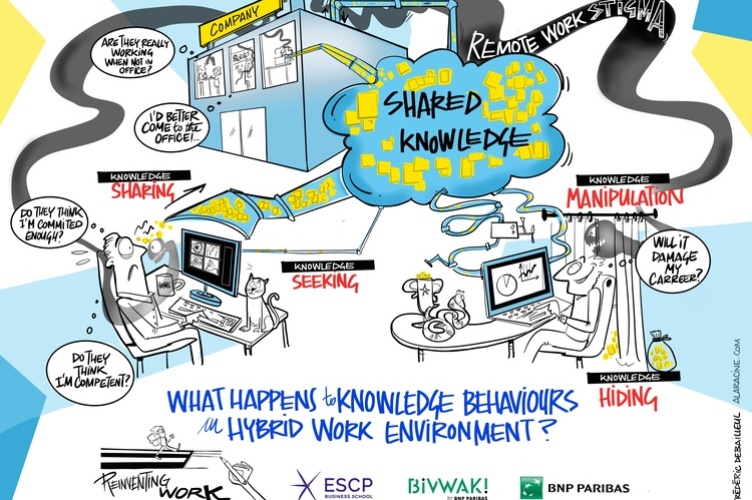Knowledge management practices in the hybrid work environment A fascinating project launched in May 2024
Research context
Pre-COVID research suggested that remote work could inhibit knowledge seeking and sharing due to the lack of face-to-face interactions, reducing serendipitous informal exchanges and diminishing trust between colleagues. However, the contemporary hybrid work environment offers opportunities for face-to-face interactions alongside new technologies for online communication. This raises the question: do these earlier concerns still hold today?
This project explores the idea that the intensity of knowledge exchange depends not only on the objective opportunities for face-to-face interaction (e.g., days worked in the office) but also on subjective perceptions and norms surrounding remote work. Launched within BNP Paribas Wealth Management (WM), the project aims to understand the effects of remote and hybrid work on knowledge behaviors.
Research question
How the shift to hybrid work influences knowledge exchanges among employees – that is, knowledge seeking, knowledge sharing and knowledge hiding behaviours?
Methodology and milestones
The study involved over 1100 participants across six countries (France, Luxembourg, Portugal, Hong Kong, Singapore, Taiwan) within BNP Paribas Wealth Management. It targeted employees in three professional categories—financial and technical expertise, sales development, and customer relationship management—where knowledge exchange is critical for successful role execution.
An online questionnaire was conducted in two waves: spring and summer 2024. The survey was distributed to 1130 participants, with over 400 responses for the first wave and 150 responses across both waves.
Data collection was completed in Q3 2024, followed by data cleaning in Q4 2024. Data analysis is currently underway and is expected to conclude in Q1 2025. Preliminary findings will be presented in conference paper drafts and a report for BNPP in Q2 2025.
Research team
- Tatiana Andreeva (Maynooth University, Ireland)
- Argyro Avgoustaki (ESCP, London campus)
- Emmanuelle Léon (ESCP, Paris campus)
Research keytake aways
- The persistence of remote work stigma has important consequences on knowledge behaviors
- Perceptions of whether remote work is risky for their career vary between different groups of employees, depending on their job roles, age and country where they work. Such variations can inhibit optimal uptake of remote work and collaboration between employees with different levels of remote working.
- Employees with the lowest level of remote work have higher levels of remote work stigma. Such perceptions may inhibit both the optimal level of remote work uptake for these employees, and their effective collaborations with those who do hybrid work.
- Remote work stigma can harm knowledge exchange among employees
- Since remote work may limit employee visibility, managers should actively create structured opportunities for increasing visibility of this employee group.
- Manage multiple interpretations of hybrid work availability. Employee perceptions of the organisational hybrid work policy and whether they can avail of hybrid work vary and are not always accurate. Many employees work remotely less than the policy allows and than they would prefer, because they have different concerns about technical feasibility of remote work for their role.
Key outcomes
Published academic papers
■ Abstract paper submitted to EGOS conference (2025)
■ Short conference paper to be submitted to Academy of Management Annual Meeting conference in January 2025
■ Full article to be submitted to a journal in Q3 2025
Campuses
